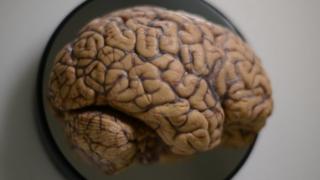 Image copyrightF WALSH
Image copyrightF WALSHWhat really happens when we make and store memories has been unravelled in a discovery that surprised even the scientists who made it.
The US and Japanese team found that the brain "doubles up" by simultaneously making two memories of events.
One is for the here-and-now and the other for a lifetime, they found.
It had been thought that all memories start as a short-term memory and are then slowly converted into a long-term one.
Experts said the findings were surprising, but also beautiful and convincing.
'Significant advance'
Two parts of the brain are heavily involved in remembering our personal experiences.
The hippocampus is the place for short-term memories while the cortex is home to long-term memories.
This idea became famous after the case of Henry Molaison in the 1950s.
His hippocampus was damaged during epilepsy surgery and he was no longer able to make new memories, but his ones from before the operation were still there.
So the prevailing idea was that memories are formed in the hippocampus and then moved to the cortex where they are "banked".
The team at the Riken-MIT Center for Neural Circuit Genetics have done something mind-bogglingly advanced to show this is not the case.
The experiments had to be performed on mice, but are thought to apply to human brains too.
They involved watching specific memories form as a cluster of connected brain cells in reaction to a shock.
Researchers then used light beamed into the brain to control the activity of individual neurons - they could literally switch memories on or off.
The results, published in the journal Science, showed that memories were formed simultaneously in the hippocampus and the cortex.
Prof Susumu Tonegawa, the director of the research centre, said: "This was surprising."
He told the BBC News website: "This is contrary to the popular hypothesis that has been held for decades.
"This is a significant advance compared to previous knowledge, it's a big shift."
The mice do not seem to use the cortex's long-term memory in the first few days after it is formed.
They forgot the shock event when scientists turned off the short-term memory in the hippocampus.
However, they could then make the mice remember by manually switching the long-term memory on (so it was definitely there).
"It is immature or silent for the first several days after formation," Prof Tonegawa said.
'Strong case'
The researchers also showed the long-term memory never matured if the connection between the hippocampus and the cortex was blocked.
So there is still a link between the two parts of the brain, with the balance of power shifting from the hippocampus to the cortex over time.
Dr Amy Milton, who researches memory at Cambridge University, described the study as "beautiful, elegant and extremely impressive".
She told the BBC News website: "I'm quite surprised.
"The idea you need the cortex for memories I'm comfortable with, but the fact it's so early is a surprise.
"This is [just] one study, but I think they've got a strong case, I think it's convincing and I think this will tell us about how memories are stored in humans as well."
For now, this is simply a piece of fundamental science that explains how our bodies work.
But Prof Tonegawa says it may illuminate what goes on in some diseases of memory including dementia.
One of his previous studies showed mice with Alzheimer's were still forming memories but were not able to retrieve them.
"Understanding how this happens may be relevant in brain disease patients," he said.
Follow James on Twitter.